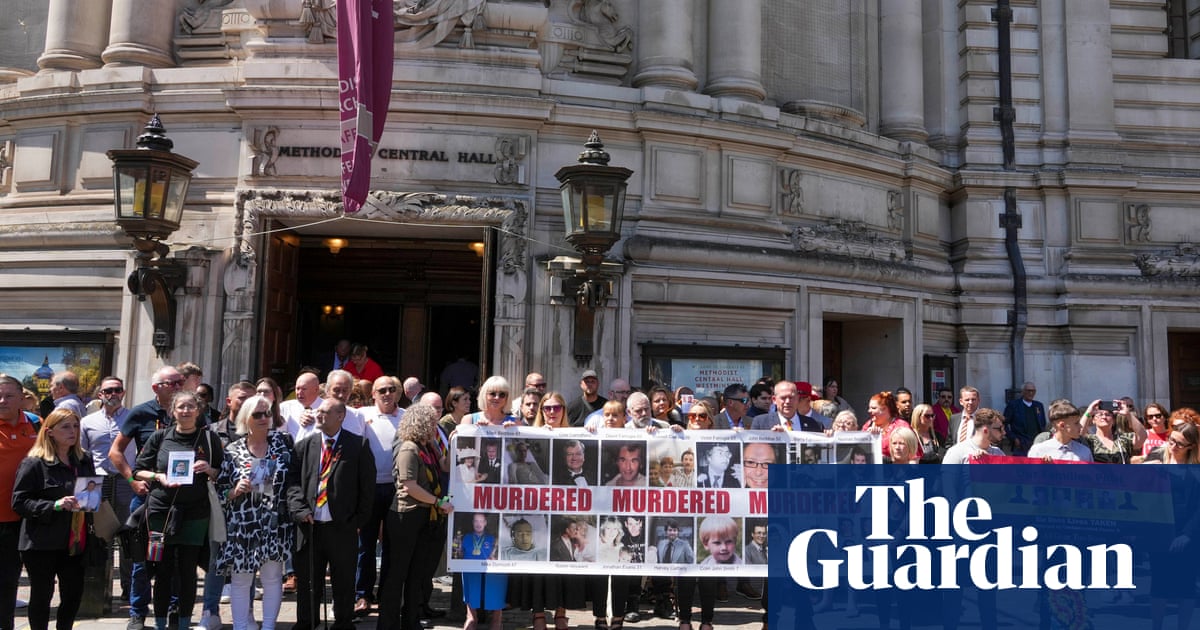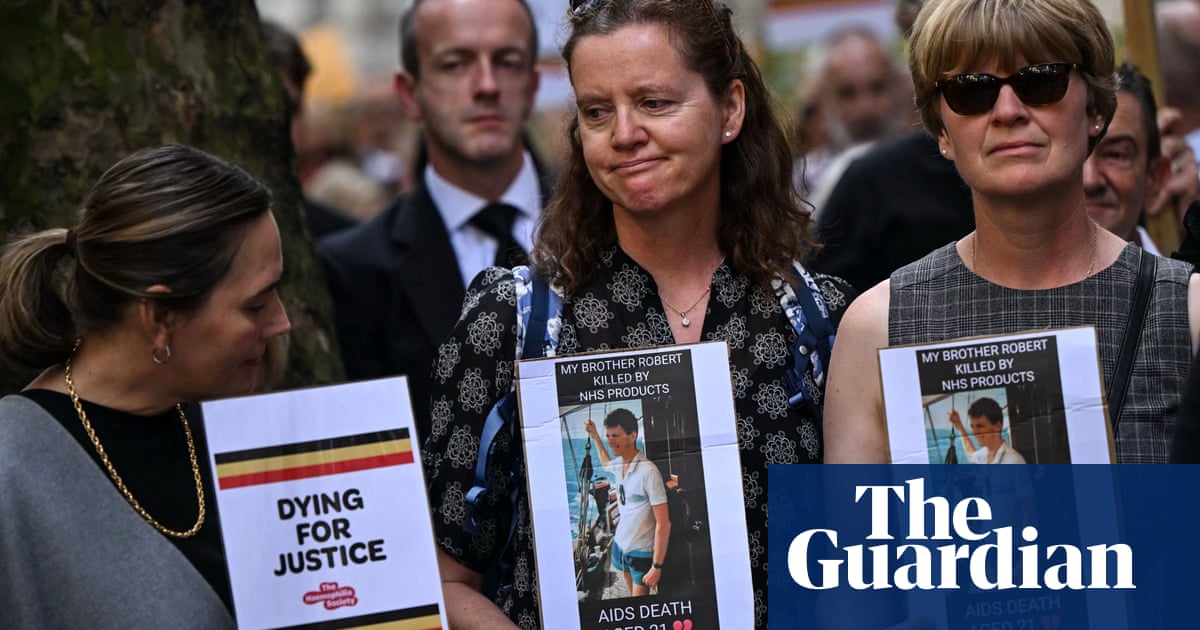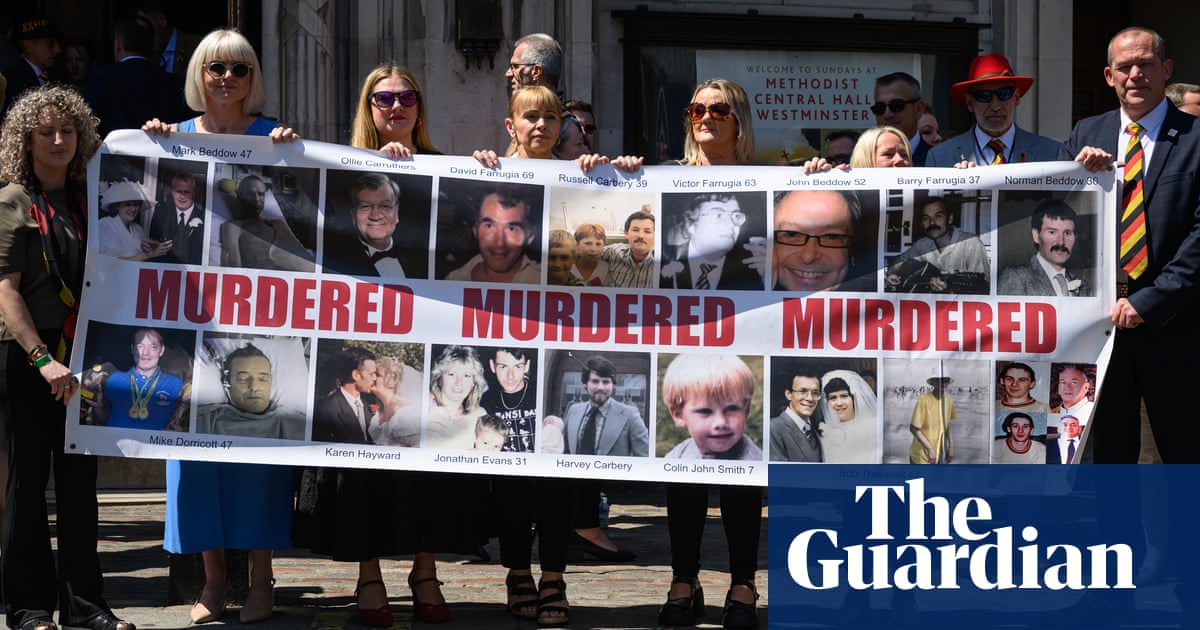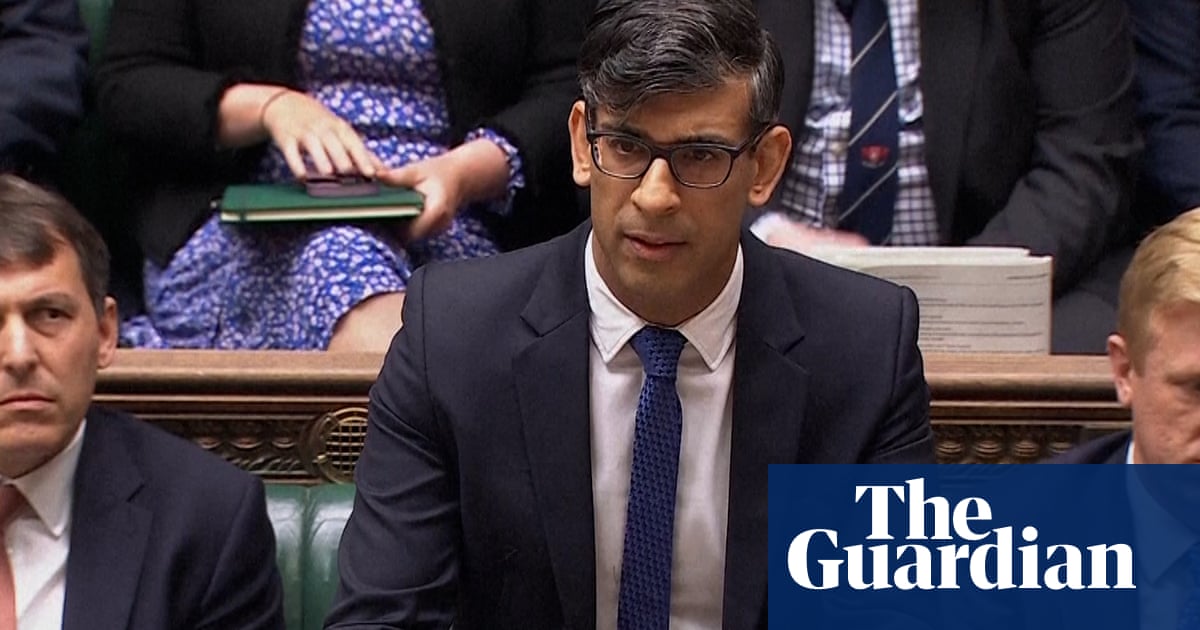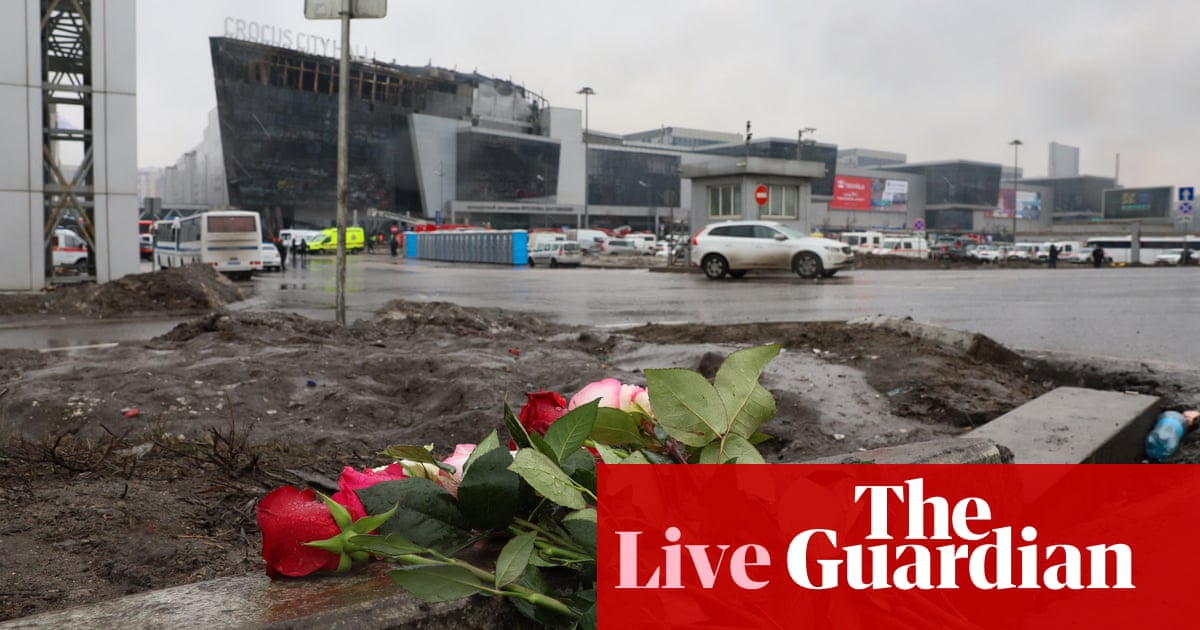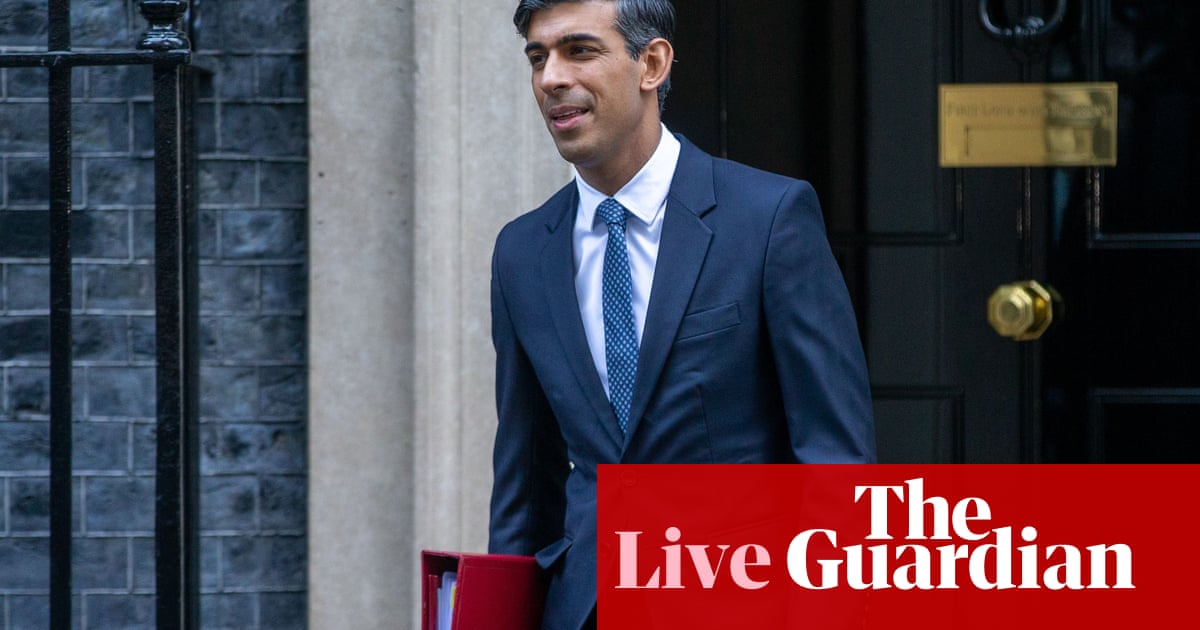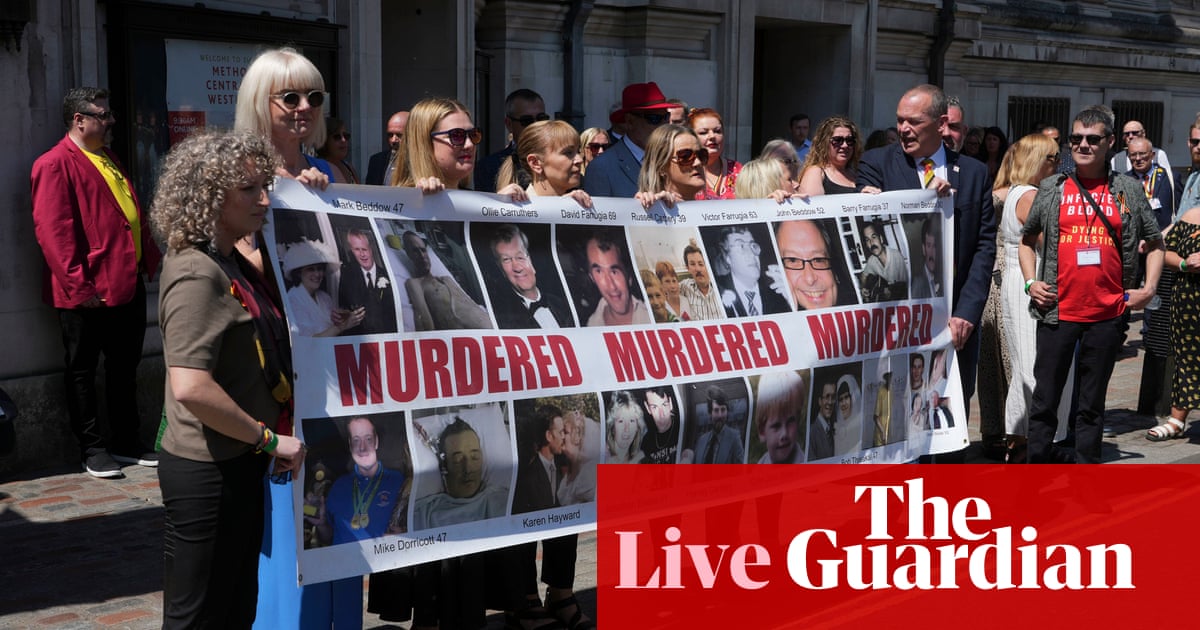
Glen says victims to get further interim payments of £210,000 within 90 days
Glen also said the government would be making further interim payments.
Victims have already received interim payments of £100,000.
Glen said, in addition to that, further interim payments of £210,000 would be made.
UPDATE: Glen said:
Today I’m announcing the government will be making further interim payments ahead of the establishment of the full scheme.
Payments of £210,000 will be made to living infected beneficiaries, those registered with existing infected blood support schemes, as well as those who register with the support scheme before the final scheme becomes operational, and the estates of those who pass away between now and payments being made.
I know that time is of the essence, which is why I’m also pleased to say that they will be delivered within 90 days, starting in the summer, so that they can reach those who need it so urgently most.
Afternoon summary
An estimated multibillion pound scheme to fully compensate UK victims of the contaminated blood scandal and their families by the end of the year has been announced, the day after a damning report found the NHS and government to be culpable for the tragedy.
The former home secretary Suella Braverman acted unlawfully in making it easier for the police to criminalise peaceful protests, the high court has ruled.
Jeremy Hunt is preparing a pre-election cut in national insurance despite a warning from the International Monetary Fund of a looming £30bn hole in the public finances, Downing Street has indicated.
Indian students and alumni in the UK have urged the British prime minister to retain graduate visas, rejecting claims they are little more than “Deliveroo visas” that allow overseas students access to low-paid jobs in the gig economy.
Countries agree international network of AI safety institutes at AI Seoul summit co-chaired by Sunak (remotely)
Ten nations and the European Union have agreed to establish an international network of publicly backed AI safety institutes to advance global research and testing of AI, PA Media reports. PA says:
Rishi Sunak said the agreement would mean “international progress” could be made on AI safety, after it was announced at the end of the first day of the AI Seoul Summit.
The UK announced it would create the world’s first AI safety institute during the AI Safety Summit held at Bletchley Park in November last year, to carry out research and voluntary evaluation and testing of AI models, with a number of other countries since announcing their own domestic institutes.
The newly signed “Seoul Statement of Intent toward International Cooperation on AI Safety Science” will see the network of institutes share research, including details about models they have studied, with the aim of advancing global understanding of the science around artificial intelligence.
Alongside the UK, the United States, Australia, Canada, France, Germany, Italy, Japan, South Korea, Singapore, and the EU signed the agreement, but one global AI powerhouse – China – was notably absent, and was not represented during the virtual meeting hosted by Sunak and South Korean president Yoon Suk Yeol.
Andrew Mitchell, the deputy foreign secretary, told the Commons business committee that the government is considering giving MPs more detail about the process by which it authorises arms exports to Israel, on the basis that they won’t be used to commit breaches of international humanitarian law (IHL), Patrick Wintour reports.
Andrew Mitchell, the deputy foreign secretary says in light of concern about Israeli arms export process he will “look to see what more detail we can offer in writing about IHL assessment both in terms of process and substance” Says he will come come back to parliament, and the business committee. Appears to be offering a version or summary of the advice, something ministers have hitherto opposed.
Just Stop Oil, one of the protest groups singled out for particular criticism in John Woodcock’s report today on political extremism, has issued a statement saying it’s the government and its supporters who are the “real criminals”.
Referring to Woodcock’s role with an organisation run by a firm with oil company and arms firm clients, a spokesperson for Just Stop Oil said Woodcock was “entirely compromised” because of the conflict of interest. The spokesperson went on:
As such, Just Stop Oil does not recognise the legitimacy of this report.
The governments’ climate strategy has been declared unlawful for the second time and their response has been to licence yet more oil, as our climate spins out of control. Who are we going to sue for the inconvenience of flooded fields, crop failure, spiralling food costs and empty shelves?
Just this morning, the high court has ruled that Suella Braverman acted unlawfully in making it easier for the police to criminalise peaceful direct action. [See 11.18am.] History will come to regard the acts of this government and its cronies as the real criminals, which is why they will stop at nothing to silence those telling the truth and acting like we are in the emergency that we are in.
Woodcock has rejected claims that he was biased and insisted that he applied an “objective standard” when writing his report.
David Cameron, the foreign secretary, told peers this afternoon that he thought the decision by the chief prosecutor of the international criminal court (ICC) to seek arrest warrants for the Israeli PM and Hamas leaders was a mistake.
Speaking during his regular question session in the House of Lords, Cameron said:
I don’t believe for one moment that seeking these warrants is going to help get the hostages out, it’s not going to help get aid in and it’s not going to help deliver a sustainable ceasefire.
As we have said from the outset, because Israel is not a signatory to the Rome Statute and because Palestine is not yet recognised as a state we don’t think that the court has jurisdiction in this area.
Frankly I think this was a mistake in terms of position, in terms of timing, in terms of effect.
To draw moral equivalence between the Hamas leadership and the democratically elected leader of Israel I think is just plain wrong.
Robert Colvile, who runs the Centre for Policy Studies, a Tory thinktank, has welcomed at least one aspect of Angela Rayner’s speech on housing and new towns this morning. (See 12.30pm.)
It is great to see that @AngelaRayner‘s housing announcement focuses so much on beauty/quality of buildings. An agenda pushed and made cross-party by many, but particular credit to comrades Alex Morton, @boys_nicholas & @SCP_Hughes
Civil servants worried work on arms sales to Israel could breach international law, PCS union says
Dozens of civil servants are seeking to escalate possible legal action against the government which will allow them to avoid helping to arm Israel, a union has claimed.
The head of PCS union says that members in the Department for Business and Trade are concerned that they may be culpable in acts of genocide in Gaza if they assist in issuing arms licenses.
The clamour for legal action has increased since the chief prosecutor of the international criminal court said he is seeking arrest warrants for senior Hamas and Israeli officials for war crimes, a spokesperson for the union said.
“Given the ICC’s pursuit of Israel’s leaders, dozens of staff are now concerned that they are being asked to break international law,” the spokesperson said.
Fran Heathcote, the general secretary of the PCS union, is saying in a speech to members this afternoon:
Our members in BEIS London South branch and the newly formed DBT department, that are responsible for arms licensing, brought this issue to the union’s attention and raised concerns that the British government may be culpable in acts of genocide.
We are currently in talks with our lawyers to explore a potential judicial review to halt this work in its tracks.
The union has been asking ministers for its legal advice on arming Israel since January, when a preliminary ruling from the International Court of Justice (ICJ) found Israel’s acts in Gaza could amount to genocide.
A government spokesperson said:
As part of the government’s robust arms export control regime we regularly review advice on Israel’s commitment to international humanitarian law, and ministers act in accordance with that advice. At no point have any civil servants been asked to do anything in breach of the civil service code.
Michael Gove, the levelling up secretary, condemned the organisers of the recent pro-Palestinian marches in his speech this morning, claiming they were not doing enough to stop antisemitic protesters “promoting hate”. (See 10.33am.)
In response, Ben Jamal, director of the Palestine Solidarity Campaign, one of the groups organising the marches, claimed it was Gove who was the extremist.
Nobody truly committed to anti-racism and to suppressing hatred is going to take any lessons from Michael Gove … That he should choose to issue his speech at a moment when Israel is on trial in the world’s highest court for the crime of genocide and the day after its leader has been threatened with arrest warrants for war crimes from the ICC, is grotesque, but given his track record, unsurprising.
He should be devoting his energies at the moment to ensuring his government upholds its responsibilities under international law rather than trying to smear those who are protesting against the current genocide.
Furthermore, his attempts to use his speech to once again push the arguments for the pernicious anti-boycott bill to become law, reveals his agenda. This bill contains a clause that seeks to uniquely protect Israel above all other states in the world from the peaceful, ethical tactic of divestment and boycott, even whilst it commits genocide. Mr Gove discredits himself, not the Palestinian solidarity movement.
Swinney gets rid of Humza Yousaf"s spin doctor, SNP veteran Kevin Pringle
Kevin Pringle, the veteran Scottish National party spin doctor, has been laid off by John Swinney as the new first minister reshapes his team, in a move which has surprised observers at Holyrood.
A former chief spokesman and SNP head of media under Alex Salmond, Pringle was brought back into government by Humza Yousaf when he succeeded Nicola Sturgeon last year; many assumed Yousaf needed his experience and well-oiled relationship with political reporters to help reset his government.
Pringle had previously been at Charlotte Street Partners, a political and public affairs consultancy co-founded by Sturgeon’s former economy advisor Andrew Wilson.
But after Swinney swept into Bute House earlier this month after an uncontested election following Yousaf’s resignation, his name was left off the first list of special advisers published by the Scottish government.
It is unclear why Pringle was not reappointed but the possibility he is seen as too close to Salmond, now a bitter opponent of the SNP, or too willing to brief unofficially, may have been the cause.
Pringle offered a brief statement about his departure.
Working in government is a privilege, and one I greatly enjoyed, during both the last year and the years after the SNP was first elected in 2007.
I wish the Scottish government, and indeed MSPs of all parties, well in making the most of the new opportunities that lie ahead. Regarding my own professional future, I want to take a little time to explore options for fulfilling challenges outside the world of government and politics.
Here is the full text of John Glen’s statement to MPs about compensation for victims of the infected blood scandal.
Here is a paper with further details of the new £210,000 interim payments announced by Glen.
And here is the news release about the appointment of Sir Robert Francis as interim chair of the new Infected Blood Compensation Authority.
John Swinney apologises for infected blood scandal and promises "culture of openness" in Scottish public services
John Swinney, Scotland’s first minister, has just delivered his own apology, on behalf of the Scottish government, to victims of the infected blood scandal. There are 3,000 families affected in Scotland, he said.
He told MSPs:
Today, in the light of the final report from the Inquiry, on behalf of the Scottish government, and as first minister of Scotland, I apologise unreservedly to everyone who has been affected in any way by these events.
To everyone who has been affected, I want to say that you have been failed by the organisations and processes that should have been in place to protect and support you, and I am sorry for the hurt, worry and damage that you have suffered.
I acknowledge, and welcome, the apology issued by the prime minister yesterday on behalf of the UK government.
This was, rightly, a fulsome apology. But not only that, the prime minister’s statement also contained two solemn promises. First, that comprehensive compensation would be paid to both the infected and affected. And second that a fundamental rebalancing of the system will be required in any consideration of the report’s recommendations.
On the first, the Scottish government will work collaboratively with the UK government to put that into effect. On the second, the Scottish Government will take the necessary steps within our own responsibilities to make that happen.
Swinney said the report highlighted the need for “a culture of openness, a culture of transparency, a culture where patient safety is paramount” in the public sector. He went on:
That is the culture I will insist upon in our public services.
Perhaps the most striking, and indeed disturbing, statement from Sir Brian in the report is that: “This disaster was not an accident. The infections happened because those in authority - doctors, the blood services and successive governments - did not put patient safety first.”
That is something that must never ever happen.
It has taken over 50 years to get to this point. I will do everything in my power to ensure we learn the lessons from this report, from the infected blood scandal, and take all necessary steps so that no one else has to endure the heartbreak and suffering that so many families have faced.
Labour will set timetable for overseas territories to comply with money laundering rules, David Lammy says
Plans for a new timetable for Britain’s crown dependencies and overseas territories to come in line with UK requirements on money laundering will be set out by the shadow foreign secretary David Lammy later today.
He is picking up on a surprise admission reported in the Guardian by the deputy foreign secretary Andrew Mitchell that nearly 40% of money laundering in the world is being committed by the City of London and the UK overseas territories.
Mitchell also admitted that the overseas territories had failed to meet repeated UK government requests to set up public registers of beneficial share ownership, a means whereby law enforcement agencies and the public can find the ultimate owners of wealth hidden in overseas territories such as the Cayman Islands and the British Virgins Islands.
The foreign secretary, David Cameron, and Mitchell have both campaigned on the issue since 2014, but the Conservative government, following Cameron’s resignation as prime minister in 2016, effectively dropped the issue leaving London, in Lammy words, as a kleptocrat’s monopoly board.
In a speech signalling that he is determined to fill the vacuum left by the Conservatives, Lammy will say that fighting corruption will become one of the core themes of his foreign secretaryship.
He will reiterate his support for an international anti-corruption court, and vow to hold an anti-corruption summit to start to integrate the issues, including incentives for whistleblowers.
Addressing the IPPR, a left-of-centre thinktank, he will say he “passionately believes, specially as a son of the Caribbean, that our overseas territories contribute hugely not only in people to people ties when it comes to our economy and by making critical contributions to our global role in oceanic and environmental protection.”
He will say the OTs have made real progress in cooperation with enforcement, but will add it remains the case that three out of four of the offshore jurisdictions with the highest risk of involvement with international corruption are UK OTs. “This is a contradiction that cuts into our credibility. We must be honest about this and we must solve it,” he will say.
He will promise a time-bound action plan to require the OTs to come into line with international standards on transparency.
The OTs baulked at bringing in public registers of beneficial ownership last year citing an 2022 European Court of Justice ruling that raised human rights concerns about public access to the register. The OTs are not subject to the ECJ, but feel it has implications for them.
But since then the European parliament has passed new laws due to appear in a fifth EU anti-laundering directive setting out precisely who can have access.
Most of the OTs, often accused of playing for time, have promised in talks with foreign office ministers that they will implement a public register by the end of this year or in the case of the British Virgin Islands by the summer of next year. The UK government appeared to have accepted these delays, even though they contain numerous caveats.
Lammy will also point out there have been zero convictions for sanctions evasion since a panoply of laws were introduced in the wake of the Russian invasion of Ukraine, and he will ask whether the 18-fold increase in car exports to Azerbaijan suggests vehicles are being sold on into Russia. There has been a 500% increase in exports of Russian sanctioned goods since 2022 to Armenia, Kyrgyzstan, Georgia and Uzbekistan, he will point out.
Ed Conway, Sky’s economics editor, explored this issue at some length a thread on X earlier this year.
The Labour MP Diana Johnson, who as co-chair of the all-party parliamentary group on haemophilia and contaminated blood has been one of the leading campaigners on behalf of the victims of the infected blood scandal, has posted a message on X saying it is still unclear whether or not the government will accept all the recommendations of Sir Brian Langstaff’s report.
In the Commons a few minutes ago John Glen, the Cabinet Office minister, said that, given the report runs to seven volumes and more than 2,000 pages, it would take the government some time to come up with a serious response. But he said he expected to be able to give an “outline” of how the government would repond when MPs debate the report after the Whitsun recess. He said he would be opening that debate, and a health minister would be closing it.
Glen refuses to say how much full compensation package might cost, saying it is not possible to know yet
Back in the Commons, John Glen, the Cabinet Office minister, tells MPs that he cannot say how much the compensation to victims of the infected blood scheme will cost. He said the government has said it will pay whatever it has to. But he said it was not possible to say what the final figure would be because the tariff levels have not yet been set. (See 12.50pm and 12.53pm.)
There have been reports saying the full compensation bill could top £10bn.
But, as Sky’s Beth Rigby reports, the government has been reluctant to come up with a firm figure, even unofficially.
Whitehall source:
- scheme outline will meet “expectations & recommendations” of report
- won’t focus on total amount of compensation as numbers who claim & variability of entitlement so wide
- will be round of interim payments b4 (autumn) elex & perhaps some final settlements but govt have to set up an arms length body




